The Congolese Crooner Returns After Decades Away
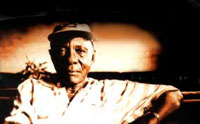 Comebacks after a long absence are one of the rarest feat in the music industry. Congolese king of crooners Wendo Kolosoy makes an impressive return (after almost four decades) with Marie Louise (Indigo). Kolosoy is a legend, one of the original pioneers of Congolese Rumba in Leopoldville, now Kinshasha, in the late 1940s, standing alongside names like Grand Kalle Kabaselle, Franco, Kwamy and Dewayon. Sidelined in the late 1960s by new arrivals like Tabu Ley Rochereau, Zaiko Langa Langa, Papa Wemba and Pepe Kalle, Wendo retreated to the obscurity of Kinshasha, making a few appearances as supporting act for the big names of the day. By early 1970s, he was a mere footnote in the music annals of Congolese music, often mentioned in print, but seldom heard in concert.
Comebacks after a long absence are one of the rarest feat in the music industry. Congolese king of crooners Wendo Kolosoy makes an impressive return (after almost four decades) with Marie Louise (Indigo). Kolosoy is a legend, one of the original pioneers of Congolese Rumba in Leopoldville, now Kinshasha, in the late 1940s, standing alongside names like Grand Kalle Kabaselle, Franco, Kwamy and Dewayon. Sidelined in the late 1960s by new arrivals like Tabu Ley Rochereau, Zaiko Langa Langa, Papa Wemba and Pepe Kalle, Wendo retreated to the obscurity of Kinshasha, making a few appearances as supporting act for the big names of the day. By early 1970s, he was a mere footnote in the music annals of Congolese music, often mentioned in print, but seldom heard in concert.
However, Marie Louise has erased all that and once more brought back the master singer. Recorded in Abidjan, the album recreates the early sound of Congolese rumba by adding a very warm and vibrant modern guitar in the mix. Yodeling and crooning, Wendo is a charming master who has never lost that enigmatic touch of timing, every note is clearly enunciated, and carefully choreographed against the music. What emerges is a multi-colored beauty that grabs one from the opening song immortalizing the late Pepe Kalle of L'Empire Bakuba. Then there is the 60s song "Marie Louise," now polished and made current by the interplay between Wendo and the jaunty guitars. My personal favorite is "Soki Olingi Ngai," a superb blend of early rumba and modern soukous, one of the most elegant and beautiful dance tunes ever.
The reawakening of the master crooner may be just what Congolese music needs in order to find its creative footing after decades of monotonous, often homogeneous sound. If so, Marie Louise is a good starting place.
King Sunny Ade Tames the Guitars, Just So
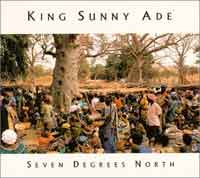 If you listen to Seven Degrees North (Mesa/Bluemoon) without the benefit of the cover sleeves, you likely would guess erroneously that it is the laid back music of the late I.K Dairo and his Blue Spots Band. This is King Sunny Ade and the African Beats taming the steel guitars and heavy percussion that characterized his two previous releases, Odu and E Dide. This album is also notably different from its predecessors in the manner with which the music is allowed to develop naturally, incrementally, until it attains its groovy sound. None of the abrupt beginning and ending that we heard in E Dide. This means longer playing time, averaging 5 minutes per song, something Ade has not done for a long time. With more room to maneuver, Ade weaves his magical voice into the talking drums and guitars, making for sweet sound not heard from juju land for a long time. The band is tight, and Ade does not let up once during the proceedings. By allowing for more interplay between the various percussive instruments, guitars and vocals, Ade is able to send us perilously close to the brink of ecstasy on such tracks like "Ariya," "Merciful God" and the rumba-based "Solution."
If you listen to Seven Degrees North (Mesa/Bluemoon) without the benefit of the cover sleeves, you likely would guess erroneously that it is the laid back music of the late I.K Dairo and his Blue Spots Band. This is King Sunny Ade and the African Beats taming the steel guitars and heavy percussion that characterized his two previous releases, Odu and E Dide. This album is also notably different from its predecessors in the manner with which the music is allowed to develop naturally, incrementally, until it attains its groovy sound. None of the abrupt beginning and ending that we heard in E Dide. This means longer playing time, averaging 5 minutes per song, something Ade has not done for a long time. With more room to maneuver, Ade weaves his magical voice into the talking drums and guitars, making for sweet sound not heard from juju land for a long time. The band is tight, and Ade does not let up once during the proceedings. By allowing for more interplay between the various percussive instruments, guitars and vocals, Ade is able to send us perilously close to the brink of ecstasy on such tracks like "Ariya," "Merciful God" and the rumba-based "Solution."
Indeed, with Seven Degrees North, Ade has demonstrated the acute sense for song writing that keeps his fans dancing around the world.
Oliver Delivers the Goods
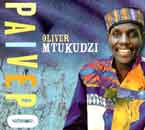 While introducing Oliver Mtukudzi to an enthusiastic Toronto crowd a while back, I committed the ultimate faux pas by yelling out to the crowd to welcome "Oliver Mtukudzi and the Black Unlimited." Of course, as everyone knows, Black Unlimited is the other Zimbabwean band, led by Thomas Mapfumo. His manager was furious for the slip-up, and would have eaten me alive, had it not been for Mtukudzi's timely intervention. "Don't worry," he told me after a hearty laugh, "my music is really different from Mapfumo's."
While introducing Oliver Mtukudzi to an enthusiastic Toronto crowd a while back, I committed the ultimate faux pas by yelling out to the crowd to welcome "Oliver Mtukudzi and the Black Unlimited." Of course, as everyone knows, Black Unlimited is the other Zimbabwean band, led by Thomas Mapfumo. His manager was furious for the slip-up, and would have eaten me alive, had it not been for Mtukudzi's timely intervention. "Don't worry," he told me after a hearty laugh, "my music is really different from Mapfumo's."
Well, on his latest album titled Paivepo (Putumayo), Mtukudzi and the Black Spirits prove the point by delivering a unique blend of chimurenga, rumba and mbaqanga, and it is nothing like Mapfumo's music or any other Zimbabwean artist. Distilling these styles, Mtukudzi creates a fluid, earthy dance rhythm, a sound of its own. There is still the tingling sensation of the mbira, but it is all produced on the clear, sensational guitars. The percussion hover in the background like well-behaved hounds, even as Mtukudzi's gravelly voice surges forward, leading the pack, now slow and then fast.
The goodness of the music spills out in carefully constructed tracks like "Sandi Bonde" with its western sensibility, "Kunze Kwadoka" with its jiving edge, and the jazzy "Ndagarwa Nhaka." Through the album, Mtukudzi controls the mood, tempo and the very heartbeat of the music. In so doing, he succeeded in ensuring that the music on Paivepo stand apart from the usual fare from Zimbabwe.
Ibrahim, the Untouchable
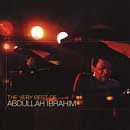 South African pianist Abdullah "Dollar Brand" Ibrahim sizzles in the latest compilation titled The Very Best of Abdullah Ibrahim (Music Club). The album is a collection of two decades of the most fantastic work by the ultimate jazz perfectionist, a musician who turned pro at age 15. From the 1979 album Echoes from Africa (Enja) we get the rare nugget with Ibrahim on piano and vocals, sweet and light like cirrus cloud. His feather-touch brilliance shines on the tribute to Monk on the track "For Monk," taken from the 1982 album African Dawn (Enja).
South African pianist Abdullah "Dollar Brand" Ibrahim sizzles in the latest compilation titled The Very Best of Abdullah Ibrahim (Music Club). The album is a collection of two decades of the most fantastic work by the ultimate jazz perfectionist, a musician who turned pro at age 15. From the 1979 album Echoes from Africa (Enja) we get the rare nugget with Ibrahim on piano and vocals, sweet and light like cirrus cloud. His feather-touch brilliance shines on the tribute to Monk on the track "For Monk," taken from the 1982 album African Dawn (Enja).
Ibrahim's African roots break through on the tracks "Zimbabwe," "Mandela," "Pule," and "Toi-Toi," and all of a sudden a whole lot is shaking beautifully. This is a timeless beauty that provides a peek into what jazz nobility is all about.

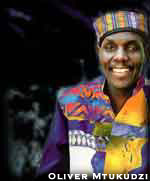
 Comebacks after a long absence are one of the rarest feat in the music industry. Congolese king of crooners Wendo Kolosoy makes an impressive return (after almost four decades) with Marie Louise (Indigo). Kolosoy is a legend, one of the original pioneers of Congolese Rumba in Leopoldville, now Kinshasha, in the late 1940s, standing alongside names like Grand Kalle Kabaselle, Franco, Kwamy and Dewayon. Sidelined in the late 1960s by new arrivals like Tabu Ley Rochereau, Zaiko Langa Langa, Papa Wemba and Pepe Kalle, Wendo retreated to the obscurity of Kinshasha, making a few appearances as supporting act for the big names of the day. By early 1970s, he was a mere footnote in the music annals of Congolese music, often mentioned in print, but seldom heard in concert.
Comebacks after a long absence are one of the rarest feat in the music industry. Congolese king of crooners Wendo Kolosoy makes an impressive return (after almost four decades) with Marie Louise (Indigo). Kolosoy is a legend, one of the original pioneers of Congolese Rumba in Leopoldville, now Kinshasha, in the late 1940s, standing alongside names like Grand Kalle Kabaselle, Franco, Kwamy and Dewayon. Sidelined in the late 1960s by new arrivals like Tabu Ley Rochereau, Zaiko Langa Langa, Papa Wemba and Pepe Kalle, Wendo retreated to the obscurity of Kinshasha, making a few appearances as supporting act for the big names of the day. By early 1970s, he was a mere footnote in the music annals of Congolese music, often mentioned in print, but seldom heard in concert.
 If you listen to Seven Degrees North (Mesa/Bluemoon) without the benefit of the cover sleeves, you likely would guess erroneously that it is the laid back music of the late I.K Dairo and his Blue Spots Band. This is King Sunny Ade and the African Beats taming the steel guitars and heavy percussion that characterized his two previous releases, Odu and E Dide. This album is also notably different from its predecessors in the manner with which the music is allowed to develop naturally, incrementally, until it attains its groovy sound. None of the abrupt beginning and ending that we heard in E Dide. This means longer playing time, averaging 5 minutes per song, something Ade has not done for a long time. With more room to maneuver, Ade weaves his magical voice into the talking drums and guitars, making for sweet sound not heard from juju land for a long time. The band is tight, and Ade does not let up once during the proceedings. By allowing for more interplay between the various percussive instruments, guitars and vocals, Ade is able to send us perilously close to the brink of ecstasy on such tracks like "Ariya," "Merciful God" and the rumba-based "Solution."
If you listen to Seven Degrees North (Mesa/Bluemoon) without the benefit of the cover sleeves, you likely would guess erroneously that it is the laid back music of the late I.K Dairo and his Blue Spots Band. This is King Sunny Ade and the African Beats taming the steel guitars and heavy percussion that characterized his two previous releases, Odu and E Dide. This album is also notably different from its predecessors in the manner with which the music is allowed to develop naturally, incrementally, until it attains its groovy sound. None of the abrupt beginning and ending that we heard in E Dide. This means longer playing time, averaging 5 minutes per song, something Ade has not done for a long time. With more room to maneuver, Ade weaves his magical voice into the talking drums and guitars, making for sweet sound not heard from juju land for a long time. The band is tight, and Ade does not let up once during the proceedings. By allowing for more interplay between the various percussive instruments, guitars and vocals, Ade is able to send us perilously close to the brink of ecstasy on such tracks like "Ariya," "Merciful God" and the rumba-based "Solution."
 While introducing Oliver Mtukudzi to an enthusiastic Toronto crowd a while back, I committed the ultimate faux pas by yelling out to the crowd to welcome "Oliver Mtukudzi and the Black Unlimited." Of course, as everyone knows, Black Unlimited is the other Zimbabwean band, led by Thomas Mapfumo. His manager was furious for the slip-up, and would have eaten me alive, had it not been for Mtukudzi's timely intervention. "Don't worry," he told me after a hearty laugh, "my music is really different from Mapfumo's."
While introducing Oliver Mtukudzi to an enthusiastic Toronto crowd a while back, I committed the ultimate faux pas by yelling out to the crowd to welcome "Oliver Mtukudzi and the Black Unlimited." Of course, as everyone knows, Black Unlimited is the other Zimbabwean band, led by Thomas Mapfumo. His manager was furious for the slip-up, and would have eaten me alive, had it not been for Mtukudzi's timely intervention. "Don't worry," he told me after a hearty laugh, "my music is really different from Mapfumo's."
 South African pianist Abdullah "Dollar Brand" Ibrahim sizzles in the latest compilation titled The Very Best of Abdullah Ibrahim (Music Club). The album is a collection of two decades of the most fantastic work by the ultimate jazz perfectionist, a musician who turned pro at age 15. From the 1979 album Echoes from Africa (Enja) we get the rare nugget with Ibrahim on piano and vocals, sweet and light like cirrus cloud. His feather-touch brilliance shines on the tribute to Monk on the track "For Monk," taken from the 1982 album African Dawn (Enja).
South African pianist Abdullah "Dollar Brand" Ibrahim sizzles in the latest compilation titled The Very Best of Abdullah Ibrahim (Music Club). The album is a collection of two decades of the most fantastic work by the ultimate jazz perfectionist, a musician who turned pro at age 15. From the 1979 album Echoes from Africa (Enja) we get the rare nugget with Ibrahim on piano and vocals, sweet and light like cirrus cloud. His feather-touch brilliance shines on the tribute to Monk on the track "For Monk," taken from the 1982 album African Dawn (Enja).
